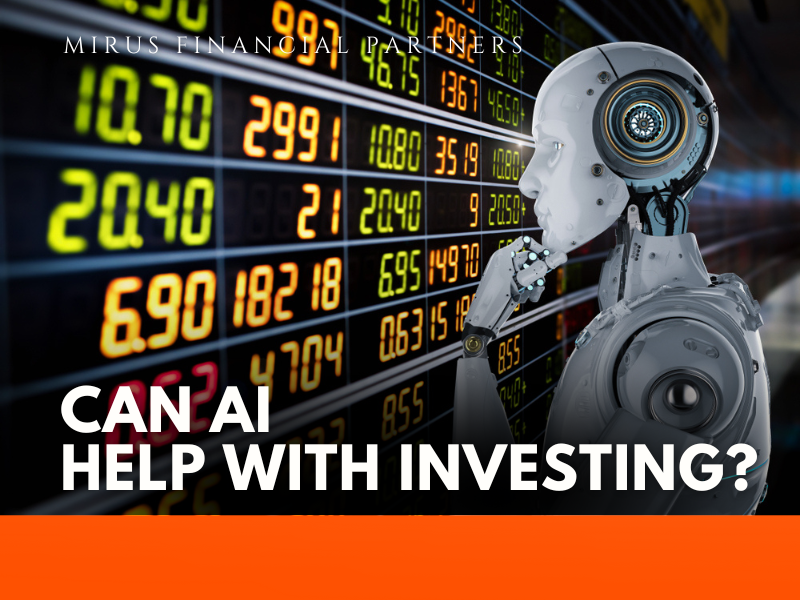What Is AI and Can it Help with Investing?
Submitted by MIRUS Financial Partners on June 11th, 2024
Artificial Intelligence (AI) refers to the simulation of human intelligence in machines. The advancements in AI in the last few years have been astronomical and have changed the way we do almost everything.
These programs are designed to perform tasks that typically require human intelligence, such as recognizing speech, making decisions, solving problems, and learning from experience. In most cases, sophisticated systems are powered by algorithms and models that process data and make predictions or decisions based on that data.
However, AI is still in its infancy stage. If you've ever had a bad experience with a computer-generated answer on a customer service call, you've seen how AI can go wrong. AI is a mimic. It can copy and guess at results, but it does not reason or apply logic in the way humans do. It also lacks nuance or deeper insight. That's why it's difficult or even impossible to get AI to complete the task in a way that is equal to (let alone better than) a human.
For these reasons, investing that leans heavily on AI input or output is rarely the best choice.
How Does AI Work?
Many people are impressed with the text-generation capabilities of AI programs like ChatGPT and Google's new Gemini. We asked ChatGPT to explain to us how its AI text generators work. This is an overview of what it told us:
ChatGPT, like other large language models (LLMs), utilizes a complex deep-learning technique called a transformer. Here's a breakdown of the key concepts:
1. Transformer Architecture: This neural network architecture focuses on relationships between words in a sequence. Unlike traditional methods, it can analyze the context of a word based on its position within a sentence or paragraph.
2. Training on Massive Datasets: ChatGPT is trained on a colossal dataset of text and code. This data includes books, articles, code repositories, and online conversations, allowing it to learn the nuances and patterns of human language.
3. The Power of Prediction: At its core, ChatGPT is a massive prediction engine. When you provide a prompt or question, the model analyzes the sequence of words and predicts the most likely word or phrase to follow based on its training data. This allows it to generate human-like text that is relevant to the context.
4. Fine-Tuning for Specific Tasks: While the base model is trained on a general dataset, it can be further fine-tuned for specific tasks. For instance, it can be trained on customer service chat logs to improve its ability to answer questions in a helpful and informative way.
5. Probabilistic Outputs: ChatGPT doesn't simply provide a single answer. It assigns probabilities to different possible continuations of the text. This allows for a degree of randomness and variation in its responses.
Limitations of ChatGPT: Despite its capabilities, ChatGPT is not a sentient being. It cannot understand the meaning of the text it generates, and its outputs can sometimes be factually incorrect or misleading. Additionally, it inherits biases present in its training data, which can lead to skewed or offensive outputs.
AI and Financial Advice
AI is a tool that may help investors and financial professionals research and prepare materials, but it's not a stand-alone tool, and AI should not be used to solicit specific financial advice. Here are a few considerations to keep in mind:
- While these text and research models predict and mimic as accurately as they can, results require careful fact-checking. Mistakes are common and sometimes significant.
- AI is built on human-generated data, and humans are not fool-proof. If the AI gets bad information, it may incorporate those mistakes into its findings.
- Programs can't access proprietary, gated, or copyrighted materials, so they can't incorporate information from the Wall Street Journal or Investors Daily. These gaps often lead to inconsistencies, inaccuracies, or just plain wrong information.
- AI Generators have already run into legal issues, so when you ask Gemini or ChatGPT a financial question (How should I invest $100?), it won't give advice. Instead, it may generate a long list of options, along with disclaimers about financial advice.
Over time, AI programs will probably get better and better at guessing, which is a version of learning. The more times people use programs like these, the better the machines get at predicting the correct answer. More usage equals more learning, which may eventually translate into more value. This means that the capabilities and accuracy of such programs may grow, but AI is far from fool-proof in 2024.
Want to Explore AI at a Novice Level?
Many of us have heard of AI but are not quite sure what it is. If you want to learn more about it, several tools are designed for people without previous AI experience. Here are a few free ways to learn and explore:
- OpenAI's ChatGPT: OpenAI offers a free tier for its GPT-3.5 model, which allows users to interact with AI and generate text-based responses. This can be a great starting point for understanding AI's capabilities in text generation and research.
- Google's Gemini: Gemini is trained on a massive dataset of text and code. This allows it to understand and generate human-like text, translate languages, write different kinds of creative content, and answer your questions in an informative way.
- FaceApp: If you like playing around with photos, look for the FaceApp app on your smartphone. It uses AI to alter and enhance photos, primarily focusing on facial images. You can change your hair and features, add glasses, or even see what you'll look like as an old (or older) person. There's a free and paid version available on smartphones. This kind of facial recognition and replacement (using more advanced programs) is what makes some movie and video effects possible, including the latest Billy Joel video that shows him singing a new song at different ages.
- Homework Help: Want some help with homework? Solvely not only answers homework questions (including math), but it also explains how and why the answer is correct. You can even ask it to explain at certain grade levels - third grade, high school, or graduate level.
AI is a Tool, Not an All-in-one Solution
Somewhere along the way, someone started worrying that AI would replace people. That's not likely, but it will continue to be a tool that all kinds of people can use to become more efficient and more effective. Just like telephones, computers, and smartphones are technologies that have been used to do things faster and more accurately than ever before, AI promises to become a significant part of all future advancements.
Your financial expert may use AI to help with parts of their jobs, but they won't use it to replace human judgment or advice. An experienced expert is still the best choice for advice and guidance when it comes to financial advice.
This information is based on opinions as of the publishing date and should not be construed as a recommendation for any specific security or sector.

